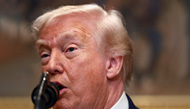Two Divergent Moments, And Views, of McCain

Hillary Rodham Clinton, Barack Obama and John McCain have constructed personas that reflect their biographies and political agendas. They can be revealing, but remain incomplete.

Senator John McCain, right, had conversations about being Senator John Kerry’s running mate in 2004.
By ELISABETH BUMILLERWASHINGTON - Senator John McCain never fails to call himself a conservative Republican as he campaigns as his party’s presumptive presidential nominee.
He often adds that he was a “foot soldier in the Reagan revolution and that he believes in the bedrock conservative principles of small government, low taxes and the rights of the unborn.
What Mr. McCain almost never mentions are two extraordinary moents in his political past that are at odds with the candidate of the present: His discussions in 2001 with Democrats about leaving the Republican Party, and his conversations in 2004 with Senator John Kerry about becoming Mr. Kerry’s running mate on the Democratic presidential ticket.
There are divergent versions of both episodes, depending on whether Democrats or Mr. McCain and his advisers are telling the story.
The episodes reveal a bitter period in Mr. McCain’s life after the 2000 presidential election, when he was, at least in policy terms, drifting away from his own party.
They also offer a glimpse into his psychological makeup and the difficulties in putting a label on his political ideology .
“There were times when he rose to the occasion and showed himself to be a real pragmatist, said Tom Daschle, the former Senate Democratic leader who met with Mr.
Mc- Cain in 2001 about switching parties and who is supporting Senator Barack Obama.
“There were other times when he was motivated by political goals and agendas that led him to be much more of a political ideologue.
Such swings are common in politics, but for Mr. McCain, Mr. Daschle said, “those swings have been far more pronounced and far more frequent.
In the spring of 2001, Mr. McCain was by most accounts still angry about the smear campaign that had been run against him when he was campaigning for the Republican presidential nomination in the South Carolina primary the previous year.
He had long blamed the Bush campaign for spreading rumors in the state that he had fathered a black child out of wedlock, which Bush aides denied.
Mr. McCain was also upset that the new White House had shut the door on hiring so many of his aides.
Mr. McCain had begun to ally himself with the Democrats on a number of issues, and had told Mr. Daschle that he planned to vote against the Bush tax cuts, a centerpiece of the new president’s domestic agenda.
Still, Democrats were stunned one Saturday in late March when, by their account, John Weaver, Mr. McCain’s longtime political strategist, reached out to Thomas J.
Downey, a former Democratic congressman from Long Island in New York, who had become a lobbyist with powerful connections on Capitol Hill.
In Mr. Downey’s telling, Mr. Weaver posed a question to him over lunch that left him stunned.
“He says, ‘John McCain is wondering why nobody’s ever approached him about switching parties, or becoming an independent and allying himself with the Democrats, Mr. Downey said in a recent interview.
“My reaction was, ‘When I leave this lunch, your boss will be called by anybody you want him to be called by in the United States Senate.’ Mr. Weaver recalls the conversation differently.
He said that Mr. Downey had told him that Democrats, eager to find a Republican who would switch sides and give them control of the evenly divided Senate, had approached some Republican senators about making the jump.
“I stated they couldn’t be so desperate as they hadn’t reached out to McCain, Mr. Weaver said in an e-mail message recently.
Whatever transpired, Mr. Downey raced home and immediately called Mr. Daschle.
It was the first step in what became weeks of conversations that April between Mr. McCain and the leading Democrats, among them Senator Edward M. Kennedy of Massachusetts and John Edwards, then a senator from North Carolina, about the possibility of Mr. Mc- Cain’s leaving his party.
Mark Salter, one of Mr. McCain’s closest advisers, said that Mr. McCain, although flattered, never took the idea of leaving the party seriously.
But less than three years later, Mr. McCain was once again in talks with the Democrats, this time over whether he would be Mr. Kerry’s running mate.
In an interview with a blog last year, Mr. Kerry said that the initial idea had come from Mr. McCain’s side, as had happened in 2001.
Two former Kerry strategists said recently that Mr. Weaver went to Mr. Kerry’s house in Georgetown, outside Washington, D.
C., a short time after Mr. Kerry won the Democratic nomination in March and asked that Mr. Kerry consider Mr. McCain as his running mate.
(Mr. Weaver said in his e-mail message that the idea had come from Mr. Kerry.) Mr. McCain said in February that he had dismissed the vice-presidential offer out of hand.
“He is, as he describes himself, a liberal Democrat, Mr. McCain said of Mr. Kerry when he was asked about the episode by a participant at a public forum in Atlanta.
“I am a conservative Republican.
So when I was approached, when we had that conversation back in 2004, that’s why I never even considered such a thing.
Three former Kerry strategists said that Mr. McCain had not immediately dismissed the notion of sharing the Democratic ticket.
“McCain did not flat-out say no, regardless of what he’s saying now, said one strategist who asked not to be named.
“He was interested in this discussion.
스마터리빙
more [ 건강]
[ 건강]이제 혈관 건강도 챙기자!
[현대해운]우리 눈에 보이지 않기 때문에 혈관 건강을 챙기는 것은 결코 쉽지 않은데요. 여러분은 혈관 건강을 유지하기 위해 어떤 노력을 하시나요?
 [ 건강]
[ 건강]내 몸이 건강해지는 과일궁합
 [ 라이프]
[ 라이프]벌레야 물럿거라! 천연 해충제 만들기
 [ 건강]
[ 건강]혈압 낮추는데 좋은 식품
[현대해운]혈관 건강은 주로 노화가 진행되면서 지켜야 할 문제라고 인식되어 왔습니다. 최근 생활 패턴과 식생활의 변화로 혈관의 노화 진행이 빨라지고
사람·사람들
more많이 본 기사
- ‘헉’ 오바마케어 보험료가 연 4만불?
- ‘남가주 사랑의 교회’ 이원준 담임목사 부임
- LAPD “툭하면 발포”… 경관 총격 사건 올들어 급증
- 가주서 노동법 위반 업주 처벌 대폭 ‘강화’
- 에어프랑스 엔진 화재 5천피트 급강하 ‘아찔’
- 엡스타인 파일서 지웠던 트럼프 사진 복원
- CBS ‘트럼프 눈치보기’?… ‘이민자 추방’ 보도 취소
- 재외공관들 성탄연휴 휴무 ‘제각각’
- 손흥민, 3년 연속 ‘KFA 올해의 골’… 볼리비아전 프리킥 득점
- 악명 높은 갱단 연루 한인 기소
- 트럼프, “100배 강력” 황금함대로 해군력 복원 시동·中 견제
- 1,480원까지 돌파한 환율… “내년에도 고공 행진”
- 김건희 특검팀, 뇌물 혐의 국토부 서기관에 징역 5년 구형
- 송성문, 샌디에고 입단 공식 발표… 4년 계약
- 트럼프, 그린란드 특사 임명… 덴마크 “우리 영토” 반발
- 국방부 인·태 차관보 한인 존 노 인준 통과
- 미국 ‘제네시스 미션’에… 엔비디아·구글·오픈AI 총출동
- 잃어버린 피부감각 되찾아준다… 유방재건, 의외의 효과
- “기부잔여신탁(CRT)의 놀라운 힘”
- 올해 AI로 전국 일자리 5만5,000개 증발
- 한화, 미국서 소송 취하 상호관세 반환 내용
- 연말 여행객 최다… LAX 공항 ‘대혼잡’
- 내란전담재판부 설치법, 본회의 통과…정통망법 상정, 필버 돌입
- 남가주 한인 ME
- 엡스타인 파일 파문 확산…정부 지연공개에 의회·피해자 공분
- 구글 혼자 삼성·SK 2배 투자… 반도체 투자 ‘국가 대항전’
- 베네수엘라 봉쇄에 금·은 값 또 최고
- 뉴욕, 마이애미 격파… 브런슨 괴력의 47점
- 공정위, 대한항공 마일리지 통합안 보완명령
- 챗GPT, 이용자 나이 판별도구 도입
- BBQ, 옐프 선정 ‘가장 사랑받는 브랜드’ 3위
- 중 부동산 공룡 ‘완커’ 손실급증·디폴트 위기
- 한인은행 신용도 ‘최우수’… 대다수 ‘별 5개’ 평가
- ‘K-도넛’, 남가주 진출·본격 확장
- 삼성 ‘엑시노스 2600’ 대량 생산… 2나노 파운드리 본격 가동
- 수도여자중·고
- 텍사스서 ‘의료수송’ 멕시코 해군 소형 항공기 추락…최소 2명 사망
- 오픈AI 수익률 개선, 마진율 68%
- 아마존, AI에이전트 출시 수요예측·재고관리 기능
- 샌프란시스코 대규모 정전 사태… 이틀만에 정상화
- 재미시인협회
- [만화경] 안중근의사 유해봉환 사업
- ‘아바타 3’ 개봉 첫 주부터 흥행
- 가족 얼굴 못 알아보고 성격 변한 부모님… “서양 기준으론 정상?”
- “불모지에 뿌린 한국어 씨앗”
- [화요칼럼] 단호박의 온기
- AI로 가속화되는 노동시장 개편
- 교육원, 가을학기 성인교육 프로그램 성료
- [정재민의 미디어풍경] 적과의 동침, 협력하며 경쟁하기
- ‘크리스마스 캐롤’과 산타 클로스
1/5지식톡

-
 미 육군 사관학교 West Poin…
0
미 육군 사관학교 West Poin…
0https://youtu.be/SxD8cEhNV6Q연락처:wpkapca@gmail.comJohn Choi: 714-716-6414West Point 합격증을 받으셨나요?미 육군사관학교 West Point 학부모 모…
-
 ☝️해외에서도 가능한 한국어 선생님…
0
☝️해외에서도 가능한 한국어 선생님…
0이 영상 하나면 충분합니다!♥️상담신청문의♥️☝️ 문의 폭주로 '선착순 상담'만 진행합니다.☎️ : 02-6213-9094✨카카오톡ID : @GOODEDU77 (@골뱅이 꼭 붙여주셔야합니다…
-
 테슬라 자동차 시트커버 장착
0
테슬라 자동차 시트커버 장착
0테슬라 시트커버, 사놓고 아직 못 씌우셨죠?장착이 생각보다 쉽지 않습니다.20년 경력 전문가에게 맡기세요 — 깔끔하고 딱 맞게 장착해드립니다!장착비용:앞좌석: $40뒷좌석: $60앞·뒷좌석 …
-
 식당용 부탄가스
0
식당용 부탄가스
0식당용 부탄가스 홀세일 합니다 로스앤젤레스 다운타운 픽업 가능 안녕 하세요?강아지 & 고양이 모든 애완동물 / 반려동물 식품 & 모든 애완동물/반려동물 관련 제품들 전문적으로 홀세일/취급하는 회사 입니다 100% …
-
 ACSL 국제 컴퓨터 과학 대회, …
0
ACSL 국제 컴퓨터 과학 대회, …
0웹사이트 : www.eduspot.co.kr 카카오톡 상담하기 : https://pf.kakao.com/_BEQWxb블로그 : https://blog.naver.com/eduspotmain안녕하세요, 에듀스팟입니다…
케이타운 1번가
오피니언
 조환동 / 편집기획국장·경제부장
조환동 / 편집기획국장·경제부장 AI로 가속화되는 노동시장 개편
 민경훈 논설위원
민경훈 논설위원‘크리스마스 캐롤’과 산타 클로스
 정재민 KAIST 문술미래전략 대학원 교수
정재민 KAIST 문술미래전략 대학원 교수 [정재민의 미디어풍경] 적과의 동침, 협력하며 경쟁하기
 김영화 수필가
김영화 수필가 [화요칼럼] 단호박의 온기
 김정곤 / 서울경제 논설위원
김정곤 / 서울경제 논설위원[만화경] 안중근의사 유해봉환 사업
 권지숙
권지숙 오후에 피다
 옥세철 논설위원
옥세철 논설위원말살되고 있는 유럽의 성탄절 전통, 그 원인은…

외로운 이웃들
 조지 F·윌 워싱턴포스트 칼럼니스트
조지 F·윌 워싱턴포스트 칼럼니스트 [조지 F. 윌 칼럼] MIT에 대한 트럼프의 무분별한 공격
1/3지사별 뉴스

빅애플 2025년 송년회
빅애플(대표 여주영)은 지난 19일 퀸즈 베이사이드 소재 산수갑산2 연회장에서 2025년 송년회를 열고 회원들간 화합과 친목을 도모했다. 이날…
재미 한인이산가족 상봉 길 열렸다

미주한인 이산가족 북한 고향 길 열려
“그리워하면 언젠가 만나게 되는…” 노래 가사처럼 그리워하면 다시 만날 수 있을까. 재미한인이산가족들은 그렇게 그리워하며 반세기가 넘게 기다리…
워싱턴 메트로지역 5세이하 아동인구 20년새 1.8%⇩

연말 ‘로드레이지’ 비극… 한인 총격 피살
연말을 맞아 도로 위에서 순간적으로 벌어진 운전 중 시비가 40대 한인 가장의 총격 피살 비극으로 이어졌다. 워싱턴주 레이시 경찰국과 서스턴 …
엡스타인 파일 공개 다음날 트럼프 사진 삭제…야당서 탄핵 경고

오늘 하루 이 창 열지 않음 닫기 





















































.png)


댓글 안에 당신의 성숙함도 담아 주세요.
'오늘의 한마디'는 기사에 대하여 자신의 생각을 말하고 남의 생각을 들으며 서로 다양한 의견을 나누는 공간입니다. 그러나 간혹 불건전한 내용을 올리시는 분들이 계셔서 건전한 인터넷문화 정착을 위해 아래와 같은 운영원칙을 적용합니다.
자체 모니터링을 통해 아래에 해당하는 내용이 포함된 댓글이 발견되면 예고없이 삭제 조치를 하겠습니다.
불건전한 댓글을 올리거나, 이름에 비속어 및 상대방의 불쾌감을 주는 단어를 사용, 유명인 또는 특정 일반인을 사칭하는 경우 이용에 대한 차단 제재를 받을 수 있습니다. 차단될 경우, 일주일간 댓글을 달수 없게 됩니다.
명예훼손, 개인정보 유출, 욕설 등 법률에 위반되는 댓글은 관계 법령에 의거 민형사상 처벌을 받을 수 있으니 이용에 주의를 부탁드립니다.
Close
x